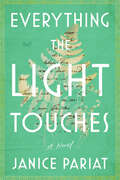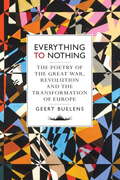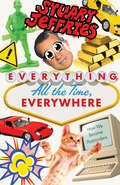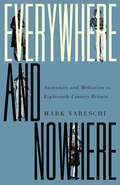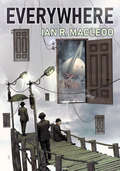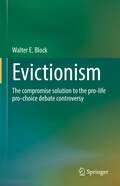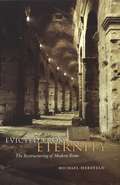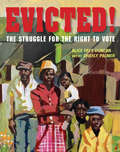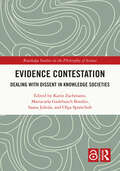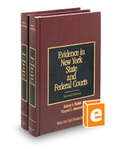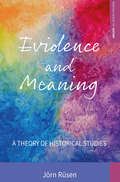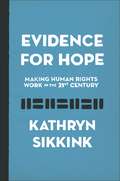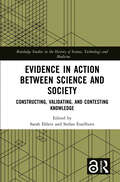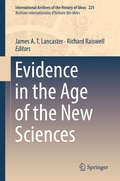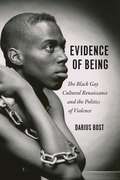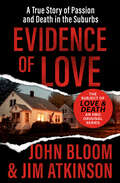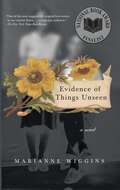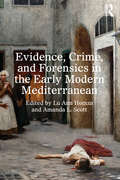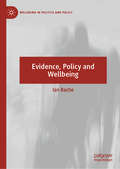- Table View
- List View
Everything the Light Touches: A Novel
by Janice Pariat“Wise, funny, touching, wide-ranging, deep-delving; whip-smart dialogue and graceful, paced sentences, thousands upon thousands of them. Written by a novelist with the eye of a poet, and a poet with the narrative powers of a novelist, this is a book that needed to be written, that tells true things, and is entirely its own being.”—Robert Macfarlane, author of The Lost Words and UnderlandOne of the most acclaimed and revered writers of her generation returns with her most ambitious novel yet—an elegant, multi-layered work, rich in imagination and exquisitely told, that interweaves a quartet of journeys across continents and centuries.As emotionally resonant as Kiran Desai’s The Inheritance of Loss, as inspired as Anthony Doerr’s Cloud Cuckoo Land, as inventive as Louisa Hall’s Speak, and as visionary as David Mitchell’s Cloud Atlas, Everything the Light Touches is Janice Pariat’s magnificent epic of travelers, of discovery, of time, of science, of human connection, and of the impermanent nature of the universe and life itself—a bold and brilliant saga that unfolds through the adventures and experiences of four intriguing characters.Shai is a young woman in modern India. Lost and drifting, she travels to her country’s Northeast and rediscovers, through her encounters with indigenous communities, ways of being that realign and renew her.Evelyn is a student of science in Edwardian England. Inspired by Goethe’s botanical writings, she leaves Cambridge on a quest to wander the sacred forests of the Lower Himalayas.Linnaeus, a botanist and taxonomist who famously declared “God creates; Linnaeus organizes,” sets off on an expedition to an unfamiliar world, the far reaches of Lapland in 1732. Goethe is a philosopher, writer, and one of the greatest minds of his age. While traveling through Italy in the 1780s, he formulates his ideas for “The Metamorphosis of Plants,” a little-known, revelatory text that challenges humankind’s propensity to reduce plants—and the world—into immutable parts.Drawn richly from scientific and botanical ideas, Everything the Light Touches is a swirl of ever-expanding themes: the contrasts between modern India and its colonial past, urban and rural life, capitalism and centuries-old traditions of generosity and gratitude, script and “song and stone.” Pulsating at its center is the dichotomy between different ways of seeing, those that fix and categorize and those that free and unify. Pariat questions the imposition of fixity—of our obsession to place permanence on plants, people, stories, knowledge, land—where there is only movement, fluidity, and constant transformation. “To be still,” says a character in the book, “is to be without life.”Everything the Light Touches brings together, with startling and playful novelty, people and places that seem, at first, removed from each other in time and place. Yet as it artfully reveals, all is resonance; all is connection.
Everything to Gain: Making the Most of the Rest of Your Life
by Jimmy Carter Rosalynn CarterFor Jimmy and Rosalynn Carter, the transition from the White House to Plains, Georgia, was painful. "Everything To Gain" is their warm and unpretentious account of their successful adjustment to a new life, full of encouragement and insight for any couple wanting to renew their commitment to each other and to life.
Everything to Nothing
by Geert BuelensThe poets' Great War: violence, revolution and modernismThe First World War changed the map of Europe forever. Empires collapsed, new countries were born, revolutions shocked and inspired the world. This tumult, sometimes referred to as 'the literary war', saw an extraordinary outpouring of writing. The conflict opened up a vista of possibilities and tragedies for poetic exploration, and at the same time poetry was a tool for manipulating the sentiments of the combatant peoples. In Germany alone during the first few months there were over a million poems of propaganda published. We think of war poets as pacifistic protestors, but that view has been created retrospectively. The verse of the time, particularly in the early years of the conflict--in Fernando Pessoa or Filippo Tommaso Marinetti, for example--could find in the violence and technology of modern warfare an awful and exhilarating epiphany. In this cultural history of the First World War, the conflict is seen from the point of view of poets and writers from all over Europe, including Rupert Brooke, Anna Akhmatova, Guillaume Apollinaire, Gabriele D'Annunzio, Vladimir Mayakovsky, Rainer Maria Rilke and Siegfried Sassoon. Everything to Nothing is the award-winning panoramic history of how nationalism and internationalism defined both the war itself and its aftermath--revolutionary movements, wars for independence, civil wars, the treaty of Versailles. It reveals how poets played a vital role in defining the stakes, ambitions and disappointments of postwar Europe.From the Hardcover edition.
Everything, All the Time, Everywhere: How We Became Postmodern
by Stuart JeffriesA radical new history of a dangerous ideaPost-Modernity is the creative destruction that has shattered our present times into fragments. It dynamited modernism which had dominated the western world for most of the 20th century. Post-modernism stood for everything modernism rejected: fun, exuberance, irresponsibility. But beneath its glitzy surface, post-modernism had a dirty secret: it was the fig leaf for a rapacious new kind of capitalism. It was also the forcing ground of the 'post truth', by means of which western values got turned upside down.But where do these ideas come from and how have they impacted on the world? In his brilliant history of a dangerous idea, Stuart Jeffries tells a narrative that starts in the early 1970s and continue to today. He tells this history through a riotous gallery that includes David Bowie, the Ipod, Frederic Jameson, the demolition of Pruit-Igoe, Madonna, Post-Fordism, Jeff Koon's 'Rabbit', Deleuze and Guattari, the Nixon Shock, The Bowery series, Judith Butler, Las Vegas, Margaret Thatcher, Grand Master Flash, I Love Dick, the RAND Corporation, the Sex Pistols, Princess Diana, the Musee D'Orsay, Grand Theft Auto, Perry Anderson, Netflix, 9/11We are today scarcely capable of conceiving politics as a communal activity because we have become habituated to being consumers rather than citizens. Politicians treat us as consumers to whom they must deliver. Can we do anything else than suffer from buyer's remorse?
Everywhere and Nowhere: Anonymity and Mediation in Eighteenth-Century Britain
by Mark VareschiA fascinating analysis of anonymous publication centuries before the digital ageEverywhere and Nowhere considers the ubiquity of anonymity and mediation in the publication and circulation of eighteenth-century British literature—before the Romantic creation of the &“author&”—and what this means for literary criticism. Anonymous authorship was typical of the time, yet literary scholars and historians have been generally unable to account for it as anything more than a footnote or curiosity. Mark Vareschi shows the entangled relationship between mediation and anonymity, revealing the nonhuman agency of the printed text. Drawing richly on quantitative analysis and robust archival work, Vareschi brings together philosophy, literary theory, and media theory in a trenchant analysis, uncovering a history of textual engagement and interpretation that does not hinge on the known authorial subject.In discussing anonymous poetry, drama, and the novel along with anonymously published writers such as Daniel Defoe, Frances Burney, and Walter Scott, he unveils a theory of mediation that renews broader questions about agency and intention. Vareschi argues that textual intentionality is a property of nonhuman, material media rather than human subjects alone, allowing the anonymous literature of the eighteenth century to speak to contemporary questions of meaning in the philosophy of language. Vareschi closes by exploring dubious claims about the death of anonymity and the reexplosion of anonymity with the coming of the digital. Ultimately, Everywhere and Nowhere reveals the long history of print anonymity so central to the risks and benefits of the digital culture.
Everywhere: The Collected Short Stories and Novellas of Ian R. MacLeod 1 (The Collected Short Stories and Novellas of Ian R. MacLeod #1)
by Ian R. MacLeod“MacLeod is a brilliant writer.” —Tim Powers“Ian MacLeod writes like an angel. He strings together ideally chosen words into sentences that are variously lush, sparse, subtle, bold, joyous, mournful, comic and tragic.” —Paul Di FilippoWelcome to the first half of the collected worlds of one of fiction’s great myth-makers. Blending naturalistic settings with real—and unreal—histories, dark presents, strange pasts and star-flung futures, Ian R. MacLeod’s multi award-winning stories defy easy classification, but are always vividly elegant, compelling, and filled with wonder.In Grownups, a young boy discovers the strange facts of life in a very different—yet also alarmingly recognizable—world, whilst New Light on the Drake Equation focusses on one man’s quest to prove there is still a chance of intelligent life existing beyond Earth, and in Ephemera a very strange librarian has final charge of all the world’s knowledge and culture, and The Master Miller’s Tale tells of obsessive love as a bucolic past dissolves into the magics of industry, iron and steam.Nothing in MacLeod’s visions is ever quite what it seems, yet they remain deeply real and involving. If you haven’t read MacLeod before, you can expect to be moved and surprised. If you have, then you need no further introduction other than to say that Everywhere—and its companion volume Nowhere, which features many of his best shorter stories—represent a generous and wide-ranging summary of his work, along with many insights into the creative process which are provided by the fresh introductions and afterwords.Praise for Ian R. MacLeod“Ian R. MacLeod is rapidly becoming one of the contemporary stars of the genre.” —Brian Aldiss“MacLeod is set to become a writer of the magnitude of Dickens and Tolkien.” —G. P. Taylor“I have no idea what he looks like, but I picture an angle with polychrome wings, dirty hands and a well-chewed pencil.” —Gene Wolf“...in many ways the mature culmination of the New Wave’s aggressive appropriation of literary tropes and techniques and the skillful integration of them into subtle, penetrating fiction that, like all true and dangerous art, can pierce and transform the reader.” —Jack Dann“Stands beside the achievements of China Mieville.” —Jeff VanderMeer“There are moments when you see a life entire... in a moment. And you smile, because you recognize that smell of the world, that capsule of living.” —John Clute“Ian R. MacLeod is one hell of a writer—literary, inventive, always surprising. Pay attention: this guy is important.” —Michael Swanwick
Evicitionism: The compromise solution to the pro-life pro-choice debate controversy
by Walter E. BlockThis book applies libertarian property rights theory to a vexing controversy, abortion. This book offers a compromise solution that will not fully please either of the two sides of this debate, but, is the only possible reconciliation between the two. Nor are its benefits limited to the fact that the opposing forces in this debate may be brought together. Evictionism, also, is the only philosophical position compatible with human rights; neither of the other two can make this claim.There are many other publications and learned articles supporting the pro-life position as well as defending the pro-life viewpoint. This is the only book that offers a perspective on abortion that is radically different than both. This book uniquely applies private property rights theories we all agree upon when referred to issues such as real estate, crime, torts, etc., to abortion. The underlying philosophical contribution of Evictionism this book presents is that these basic legal premises can be utilized in this controversial case as well as practically everywhere else in law.Want to solve the abortion controversy? Want to demonstrate that both the pro-life and the pro-choice positions are erroneous? Want to read about a position that is a compromise between the pro-life and the pro-choice positions? Then this book provides robust understanding, discussions and applications for getting to the truth about this issue.
Evicted from Eternity: The Restructuring of Modern Rome
by Michael HerzfeldModern Rome is a city rife with contradictions. Once the seat of ancient glory, it is now often the object of national contempt. It plays a significant part on the world stage, but the concerns of its residents are often deeply parochial. And while they live in the seat of a world religion, Romans can be vehemently anticlerical. These tensions between the past and the present, the global and the local, make Rome fertile ground to study urban social life, the construction of the past, the role of religion in daily life, and how a capital city relates to the rest of the nation. Michael Herzfeld focuses on Rome's historic Monti district and the wrenching dislocation caused by rapid economical, political, and social change. Evicted from Eternity tells the story of the gentrification of Monti- once the architecturally stunning home of a community of artisans and shopkeepers now displaced by an invasion of rapacious real estate speculators, corrupt officials, dithering politicians, deceptive clerics, and shady thugs. As Herzfeld picks apart the messy story of Monti's transformation, he ranges widely over many aspects of life there and in the rest of the city, richly depicting the uniquely local landscape of globalization in Rome.
Evicted!: The Struggle for the Right to Vote
by Alice Faye DuncanThis critical civil rights book for middle-graders examines the little-known Tennessee's Fayette County Tent City Movement in the late 1950s and reveals what is possible when people unite and fight for the right to vote. Powerfully conveyed through interconnected stories and told through the eyes of a child, this book combines poetry, prose, and stunning illustrations to shine light on this forgotten history.The late 1950s was a turbulent time in Fayette County, Tennessee. Black and White children went to different schools. Jim Crow signs hung high. And while Black hands in Fayette were free to work in the nearby fields as sharecroppers, the same Black hands were barred from casting ballots in public elections. If they dared to vote, they faced threats of violence by the local Ku Klux Klan or White citizens. It wasn't until Black landowners organized registration drives to help Black citizens vote did change begin--but not without White farmers' attempts to prevent it. They violently evicted Black sharecroppers off their land, leaving families stranded and forced to live in tents. White shopkeepers blacklisted these families, refusing to sell them groceries, clothes, and other necessities. But the voiceless did finally speak, culminating in the Voting Rights Act of 1965, which legally ended voter discrimination. Perfect for young readers, teachers/librarians, and parents interested in books for kids with themes of: • Activism • Social justice • Civil rights • Black history
Evidence
by Lucy SanteFollowing Low Life, Lucy Sante's acclaimed evocation of the underside of New York City's history, Evidence is an investigation into the mysteries of crime, death, and photography that only this brilliant and original writer could conduct.In one sense Evidence is a picture book - a collection of 55 evidence photographs taken by the New York City Police Department between 1914 and 1918. These are startling images, some brutal, some poetic, and all possessed of a strange and spectral beauty.Lucy Sante minutely examines these pictures of crime scenes and draws them out by every possible means: speculating about the lives and deaths depicted; discussing the progress of the forensic use of photographs and the mission of photography itself; and, where possible, reconstructing the events that led up to these frozen terminal images. Evidence is many things at once: aesthetic object, historical and sociological document, mystery novel, memento mori, and time machine.
Evidence Contestation: Dealing with Dissent in Knowledge Societies (Routledge Studies in the Philosophy of Science)
by Mariacarla Gadebusch Bondio Karin Zachmann Saana Jukola Olga SparschuhThis book examines the practices of contesting evidence in democratically constituted knowledge societies. It provides a multifaceted view of the processes and conditions of evidence criticism and how they determine the dynamics of de- and re-stabilization of evidence. Evidence is an essential resource for establishing claims of validity, resolving conflicts, and legitimizing decisions. In recent times, however, evidence is being contested with increasing frequency. Such contestations vary in form and severity—from questioning the interpretation of data or the methodological soundness of studies to accusations of evidence fabrication. The contributors to this volume explore which actors, for what reasons and to what effect, question evidence in fields such as the biological, environmental, and health sciences. In addition to actors inside academia, they examine the roles of various other actors, including citizen scientists, counter-experts, journalists, patients, consumers, and activists. The contributors tackle questions of how disagreements are framed and how they are used to promote vested interests. By drawing on methodological and theoretical approaches from a wide range of fields, this book provides a much-needed perspective on how evidence criticism influences the development and state of knowledge societies and their political condition. Evidence Contestation will appeal to scholars and advanced students working in philosophy of science, epistemology, bioethics, science and technology studies, the history of science and technology, and science communication.
Evidence In New York State And Federal Courts (New York Practice Series #Second Edition, Volume 5)
by Robert A. Barker Vincent C. AlexanderEVIDENCE IN NEW YORK STATE AND FEDERAL COURTS SECOND EDITION Volume 5
Evidence In New York State And Federal Courts 2d (New York Practice Series #Volume 5A)
by Robert A. Barker Vincent C. AlexanderThis comprehensive publication on the law of evidence in New York includes a summary of corresponding law under the Federal Rules of Evidence (FRE). The authors synthesize and explain the complex mix of cases and statutes, while examining the purpose and requirements of the rules, together with discussion of leading cases. The title also includes New York's evidence statutes and the relevant FRE in their restyled format. Chapters cover general principles, judicial notice, burden of proof and presumptions, relevancy, privileges, witnesses, opinions and expert testimony, hearsay, authentication and identification, best evidence, and real and demonstrative evidence.
Evidence Not Seen: A Woman's Miraculous Faith in a Japanese Prison Camp During WWII
by Darlene Deibler RoseThis is the story of the author's life as a young missionary to New Guinea, and her subsequent capture and imprisonment in a Japanese prison camp.
Evidence and Faith
by Charles TaliaferroCharles Taliaferro has written a dynamic narrative history of philosophical reflection on religion from the seventeenth century to the present, with an emphasis on shifting views of faith and the nature of evidence. The book begins with the movement called Cambridge Platonism, which formed a bridge between the ancient and medieval worlds and early modern philosophy. While the book provides a general overview of different movements in philosophy, it also offers a detailed exposition and reflection on key arguments. The scope is broad, from Descartes to contemporary feminist philosophy of religion. Written with clarity and verve, this is a book that will appeal to professionals and students in the philosophy of religion, religious studies, and the history of ideas, as well as informed lay readers.
Evidence and Meaning: A Theory of Historical Studies (Making Sense of History #28)
by Jörn RüsenAs one of the premier historical thinkers of his generation, Jörn Rüsen has made enormous contributions to the methods and theoretical framework of history as it is practiced today. In Evidence and Meaning, Rüsen surveys the seismic changes that have shaped the historical profession over the last half-century, while offering a clear, economical account of his theory of history. To traditional historiography Rüsen brings theoretical insights from philosophy, narrative theory, cultural studies, and the social sciences, developing an intricate but robust model of "historical thinking" as both a cognitive discipline and a cultural practice-one that is susceptible neither to naïve empiricism nor radical relativism.
Evidence and the Archive: Ethics, Aesthetics and Emotion
by Trish Luker Katherine BiberThis collection explores the stakes, risks and opportunities invoked in opening and exploring law’s archive and re-examining law’s evidence. It draws together work exploring how evidence is used or mis-used during the legal process, and re-used after the law’s work has concluded by engaging with ethical, aesthetic or emotional dimensions of using law’s evidence. Within socio-legal discourse, the move towards ‘open justice’ has emerged concurrently with a much broader cultural sensibility, one that has been called the "archival turn" (Ann Laura Stoler), the "archival impulse" (Hal Foster) and "archive fever" (Jacques Derrida). Whilst these terms do not describe exactly the same phenomena, they collectively acknowledge the process by which we create a fetish of the stored document. The archive facilitates our material confrontation with history, historicity, order, linearity, time and bureaucracy. For lawyers, artists, journalists, publishers, curators and scholars, the document in the archive has the attributes of authenticity, contemporaneity, and the unique tangibility of a real moment captured in material form. These attributes form the basis for the strict interpretive limits imposed by the rules of evidence and procedure. These rules do not contain the other attributes of the archival document, those that make it irresistible as the basis for creative work: beauty, violence, surprise, shame, volume, and the promise that it contains a tantalising secret. This book was previously published as a special issue of Australian Feminist Law Journal.
Evidence for Hope: Making Human Rights Work in the 21st Century
by Kathryn SikkinkA history of the successes of the human rights movement and a case for why human rights workEvidence for Hope makes the case that, yes, human rights work. Critics may counter that the movement is in serious jeopardy or even a questionable byproduct of Western imperialism. They point out that Guantánamo is still open, the Arab Spring protests have been crushed, and governments are cracking down on NGOs everywhere. But respected human rights expert Kathryn Sikkink draws on decades of research and fieldwork to provide a rigorous rebuttal to pessimistic doubts about human rights laws and institutions. She demonstrates that change comes slowly and as the result of struggle, but in the long term, human rights movements have been vastly effective.Attacks on the human rights movement’s credibility are based on the faulty premise that human rights ideas emerged in North America and Europe and were imposed on developing southern nations. Starting in the 1940s, Latin American leaders and activists were actually early advocates for the international protection of human rights. Sikkink shows that activists and scholars disagree about the efficacy of human rights because they use different yardsticks to measure progress. Comparing the present to the past, she shows that genocide and violence against civilians have declined over time, while access to healthcare and education has increased dramatically. Cognitive and news biases contribute to pervasive cynicism, but Sikkink’s investigation into past and current trends indicates that human rights is not in its twilight. Instead, this is a period of vibrant activism that has made impressive improvements in human well-being.Exploring the strategies that have led to real humanitarian gains since the middle of the twentieth century, Evidence for Hope looks at how these essential advances can be supported and sustained for decades to come.
Evidence in Action between Science and Society: Constructing, Validating, and Contesting Knowledge (Routledge Studies in the History of Science, Technology and Medicine)
by Sarah EhlersThis volume is an interdisciplinary attempt to insert a broader, historically informed perspective into current political and academic debates on the issue of evidence and the reliability of scientific knowledge. The tensions between competing paradigms, different bodies of knowledge and the relative hierarchies between them are a crucial element of the historical and contemporary dynamics of scientific knowledge production. The negotiation of evidence is at the heart of this process. Starting from the premise that evidence constitutes a central, but also essentially contested concept in contemporary knowledge-based societies, this volume focuses on how evidence is generated and applied in practice—in other words, on “evidence in action.” The contributions analyze and compare different evidence practices within the field of science and technology, how they interlink with different forms of power, their interaction with and impact on the legal and political domain, and their relationship to other, more heterodox forms of evidence that challenge traditional notions of evidence. In doing so, this volume provides much-needed context and historical background to contemporary debates on the so-called “post-truth” society. Evidence in Action is the perfect resource for all those interested in the relationship between science, technology, and the role of knowledge in society.
Evidence in the Age of the New Sciences (International Archives of the History of Ideas Archives internationales d'histoire des idées #225)
by James A.T. Lancaster Richard RaiswellThe motto of the Royal Society—Nullius in verba—was intended to highlight the members’ rejection of received knowledge and the new place they afforded direct empirical evidence in their quest for genuine, useful knowledge about the world. But while many studies have raised questions about the construction, reception and authentication of knowledge, Evidence in the Age of the New Sciences is the first to examine the problem of evidence at this pivotal moment in European intellectual history. What constituted evidence—and for whom? Where might it be found? How should it be collected and organized? What is the relationship between evidence and proof? These are crucial questions, for what constitutes evidence determines how people interrogate the world and the kind of arguments they make about it.In this important new collection, Lancaster and Raiswell have assembled twelve studies that capture aspects of the debate over evidence in a variety of intellectual contexts. From law and theology to geography, medicine and experimental philosophy, the chapters highlight the great diversity of approaches to evidence-gathering that existed side by side in the sixteenth and seventeenth centuries. In this way, the volume makes an important addition to the literature on early science and knowledge formation, and will be of particular interest to scholars and advanced students in these fields.
Evidence of Being: The Black Gay Cultural Renaissance and the Politics of Violence
by Darius BostEvidence of Being opens on a grim scene: Washington DC’s gay black community in the 1980s, ravaged by AIDS, the crack epidemic, and a series of unsolved murders, seemingly abandoned by the government and mainstream culture. Yet in this darkest of moments, a new vision of community and hope managed to emerge. Darius Bost’s account of the media, poetry, and performance of this time and place reveals a stunning confluence of activism and the arts. In Washington and New York during the 1980s and ’90s, gay black men banded together, using creative expression as a tool to challenge the widespread views that marked them as unworthy of grief. They created art that enriched and reimagined their lives in the face of pain and neglect, while at the same time forging a path toward bold new modes of existence. At once a corrective to the predominantly white male accounts of the AIDS crisis and an openhearted depiction of the possibilities of black gay life, Evidence of Being above all insists on the primacy of community over loneliness, and hope over despair.
Evidence of Love: A True Story of Passion and Death in the Suburbs
by John Bloom Jim AtkinsonThe &“fascinating&” true story behind the HBO Max and Hulu series about Texas housewife Candy Montgomery and the bizarre murder that shocked a community (Los Angeles Times Book Review). Candy Montgomery and Betty Gore had a lot in common: They sang together in the Methodist church choir, their daughters were best friends, and their husbands had good jobs working for technology companies in the north Dallas suburbs known as Silicon Prairie. But beneath the placid surface of their seemingly perfect lives, both women simmered with unspoken frustrations and unanswered desires. On a hot summer day in 1980, the secret passions and jealousies that linked Candy and Betty exploded into murderous rage. What happened next is usually the stuff of fiction. But the bizarre and terrible act of violence that occurred in Betty&’s utility room that morning was all too real. Based on exclusive interviews with the Gore and Montgomery families, Edgar Award finalist Evidence of Love is the &“superbly written&” account of a gruesome tragedy and the trial that made national headlines when the defendant entered the most unexpected of pleas: not guilty by reason of self-defense (Fort Worth Star-Telegram). Adapted into the Emmy and Golden Globe Award–winning television movie A Killing in a Small Town—as well as the new limited series Candy on Hulu and Love and Death on HBO Max—this chilling tale of sin and savagery will &“fascinate true crime aficionados&” (Kirkus Reviews).
Evidence of Things Unseen: A Novel
by Marianne WigginsThis poetic novel, by the acclaimed author of John Dollar, describes America at the brink of the Atomic Age. In the years between the two world wars, the future held more promise than peril, but there was evidence of things unseen that would transfigure our unquestioned trust in a safe future.Fos has returned to Tennessee from the trenches of France. Intrigued with electricity, bioluminescence, and especially x-rays, he believes in science and the future of technology. On a trip to the Outer Banks to study the Perseid meteor shower, he falls in love with Opal, whose father is a glassblower who can spin color out of light.Fos brings his new wife back to Knoxville where he runs a photography studio with his former Army buddy Flash. A witty rogue and a staunch disbeliever in Prohibition, Flash brings tragedy to the couple when his appetite for pleasure runs up against both the law and the Ku Klux Klan. Fos and Opal are forced to move to Opal's mother's farm on the Clinch River, and soon they have a son, Lightfoot. But when the New Deal claims their farm for the TVA, Fos seeks work at the Oak Ridge Laboratory -- Site X in the government's race to build the bomb.And it is there, when Opal falls ill with radiation poisoning, that Fos's great faith in science deserts him. Their lives have traveled with touching inevitability from their innocence and fascination with "things that glow" to the new world of manmade suns.Hypnotic and powerful, Evidence of Things Unseen constructs a heartbreaking arc through twentieth-century American life and belief.
Evidence, Crime, and Forensics in the Early Modern Mediterranean
by Lu Ann Homza Amanda L. ScottRecent historians have pinpointed the ways in which legal systems in early modern Europe were improvisational, flexible, and contingent rather than immovable, hierarchical, and gendered. Evidence, Crime, and Forensics in the Early Modern Mediterranean amplifies such findings by looking at law and its consumers in the Mediterranean, broadly imagined, between 1500 and 1750. The volume’s essays enhance our awareness of how crimes were defined, evidence was offered, and forensic awareness appeared in secular, inquisitorial, and specially commissioned courts in Spain, Italy, and the Hapsburg Balkans.This collection threads an important needle: our authors recognize formal chains of command and legal commonplaces but nonetheless emphasize how such factors could be challenged, manipulated, or ignored by illiterate and vulnerable populations. It turns out that ordinary individuals in the early modern Mediterranean did not find themselves limited in their legal options, and their degree of sophistication in court speaks volumes about networks of legal knowledge. Furthermore, in no way does the use of the courts between 1500 and 1750 imply more “rational” ways of seeking justice, since emotions were always firmly on display, even if rage and regret were being deployed for performative reasons.Evidence, Crime, and Forensics in the Early Modern Mediterranean illustrates the range of questions we can put to archival sources from the early modern Mediterranean, with plentiful insights as to how legal sources can illuminate history from below. This collection will be a welcome addition for undergraduate and graduate courses on European history, as well as a provocative resource for more general audiences.
Evidence, Policy and Wellbeing (Wellbeing in Politics and Policy)
by Ian BacheThis book analyses the role of evidence in taking wellbeing from an issue that has government attention to one that leads to significant policy change. In doing so, it draws on contributions from political science, policy theory and literature specifically on the evidence and policy relationship. The book has three main aims: to understand the role of evidence in shaping the prospects for wellbeing in public policy; to inform the barriers literature on the use of evidence in policy; and, to inform the multiple streams approach (MSA) to agenda-setting. While the book focuses on developments at UK government level, a number of the findings and arguments presented here have wider significance, both in relation to wellbeing developments elsewhere and to the theoretical literatures on agenda-setting and evidence use. The book draws on insights from interviews with policy-makers and stakeholders that were undertaken as part of the work of the Community Wellbeing Evidence Programme of the What Works Centre for Wellbeing.
